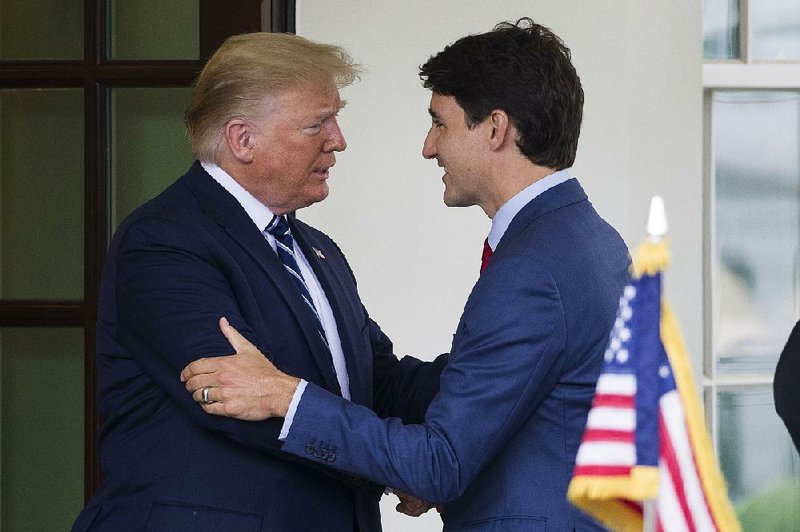The new trade deal between the U.S., Canada and Mexico will allow the countries to compete as a region against the European Union and China, President Donald Trump said Thursday during a meeting with Canadian Prime Minister Justin Trudeau.
Trump struck a collaborative tone hailing a deal with two countries whose trade practices he's regularly criticized in the past. The U.S.-Mexico-Canada Agreement is great for farmers, manufacturers and workers, he said.
"This brings us into a position where we're not competing with each other, we're competing against the world," Trump told reporters in the Oval Office on Thursday at the start of his meeting with Trudeau. "We're competing with the European Union, we're competing with China, it gives us a bigger dialogue, it gives us a much bigger platform. It's really good for all three."
Trump, Trudeau and former Mexican President Enrique Pena Nieto signed the deal late last year after grueling talks in which Trump regularly said Canada and Mexico were taking advantage of the U.S. He often threatened to abandon the current pact, the North American Free Trade Agreement.
The White House recently moved to ease passage of the agreement by lifting tariffs on imported steel and aluminum from Canada and Mexico.
"We were very pleased with the lifting of tariffs on steel and aluminum," Trudeau said.
Mexico has ratified the new deal, leaving the U.S. and Canada to do the same.
In the U.S., it comes down to whether House Speaker Nancy Pelosi, D-Calif., will bring to a vote a bill that would implement changes necessary to enact the agreement. She insists that changes are needed to generate Democratic support, and has appointed a working group to meet with United States Trade Representative Robert Lighthizer on finding ways to ease Democratic lawmakers' concerns.
"My hope is that over the course of the next couple of weeks we can make substantial progress," Lighthizer told a Senate panel Tuesday.
Trump said be believed it would eventually pass Congress.
"Let's see what happens, but I really believe that Nancy Pelosi and the House will approve it, I think the Senate will approve it rapidly," he said. He said that he thought politics was holding up a vote.
"The day after the election, it would win with tremendous support but we have an election coming up," he said. "But I think Nancy Pelosi's going to do the right thing."
The Trump administration is urging Congress to approve the trade deal before lawmakers leave for their monthlong August recess. But House Democrats have identified four areas they want to address before the agreement is put to a vote: labor, the environment, pharmaceuticals and an enforcement mechanism for the overall deal.
Labor unions, a key Democratic constituency, are seeking assurances that Mexico will enforce enhanced labor standards for workers there because that would reduce the incentive for U.S. companies to move their plants and jobs south of the border. The new deal requires Mexico to encourage independent unions that will bargain for higher wages and better working conditions.
"If the president insists on a premature vote, we'll have no choice but to oppose it," AFL-CIO President Richard Trumka said this week at a union event in Pittsburgh.
Democrats are also voicing concerns over language that would give pharmaceutical companies 10 years' protection from cheaper competition in a category of expensive drugs called biologics, which are made from living cells. The need to curb high drug prices has become a rallying cry for voters of all political stripes.
House Ways and Means Chairman Richard Neal, the Massachusetts Democrat leading the negotiation, expressed optimism that his colleagues could come to an agreement with the Trump administration, but he warned against rushing.
Canada's House of Commons adjourned for its summer break on Thursday, as Trudeau was in Washington to meet with Trump, Pelosi and Senate Majority Leader Mitch McConnell. Trudeau has said he could recall lawmakers this summer to pass the deal as needed, and reiterated his position that he'd move as quickly as the U.S. does.
"We're moving forward on the ratification process aligned with you," Trudeau told Trump Thursday.
Trudeau was also expected to bring up the plight of two Canadians held in China. Beijing detained ex-diplomat Michael Kovrig and entrepreneur Michael Spavor on Dec. 10 in an apparent attempt to pressure Canada to release Meng Wanzhou, a top executive at Chinese tech giant Huawei. She was arrested Dec. 1 at the request of U.S. authorities who want her to face fraud charges in the U.S.
Trump is expected to meet with Chinese President Xi Jinping at the G-20 summit next week in Japan. The president said he would bring up Canada's concerns if Trudeau requested.
"Anything I can do to help Canada I will be doing," Trump said.
Information for this article was contributed by Josh Wingrove and Anna Edgerton of Bloomberg News, and by Kevin Freking, Jill Colvin and Rob Gillies of The Associated Press.
Business on 06/21/2019
